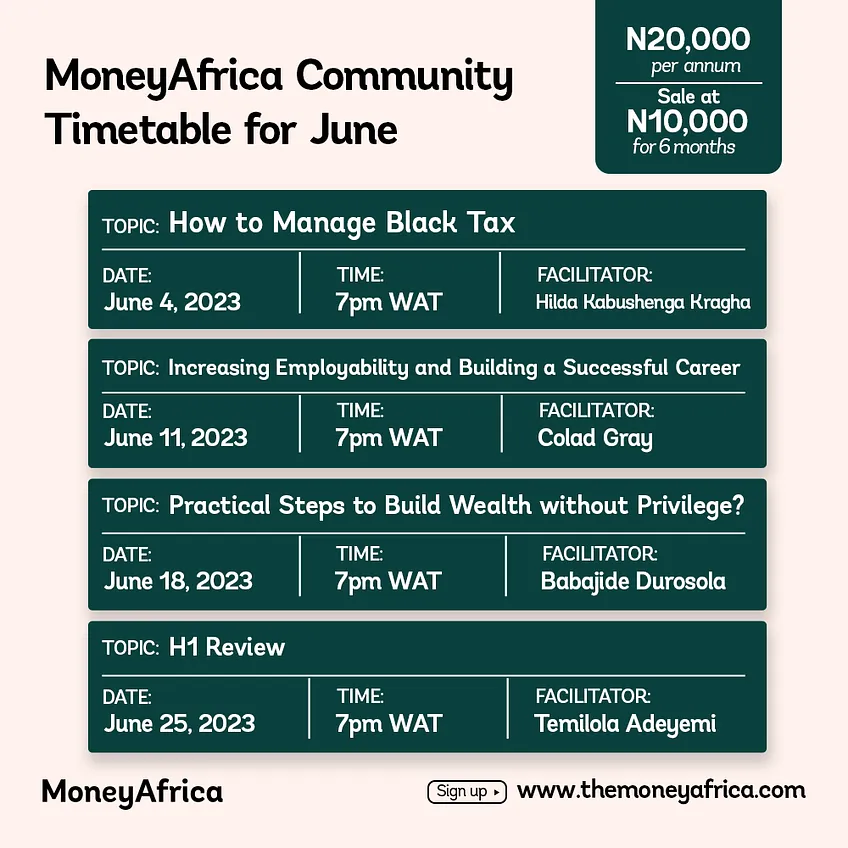Good Morning 😃
How are you doing?
Friday letters are usually dedicated to taking questions from our community. Do you have a question for us? Please feel free to
- send an e-mail to info@themoneyafrica.com; or
- send a DM to any of our social media channels, or
- simply fill out this form. Don’t worry, your responses are kept anonymous.
***
Question
With savings of N20,000 to N40,000, how do I break down my savings into categories so I can have emergency savings, regular savings and investment savings?
Answer
Breaking down your savings into different categories is a smart way to manage your finances effectively.
This is a suggestion on how you can allocate your savings into emergency savings, regular savings, and investment savings:
1. Emergency savings: Emergency savings are meant to cover unexpected expenses or financial emergencies. It’s recommended to have at least 3–6 months’ worth of living expenses saved in this category. If you’re starting with a lower amount, such as N20,000, aim to gradually build it up over time. A good starting point would be allocating around 40–50% of your savings to this category. In this case, you can set aside N8,000 to N10,000 for emergencies.
2. Regular savings: Regular savings are for planned expenses, short-term goals, or future purchases. This category helps you save for things like vacations, a new gadget, or any other specific financial goal you have in mind. Allocate another portion of your savings, around 30–40%, to regular savings. With N20,000, you can put aside N6,000 to N8,000 for this category.
3. Investment savings: Investment savings are for long-term growth and wealth accumulation. This category involves investing your money to potentially earn a higher return over time. Depending on your risk tolerance and investment knowledge, you can consider various investment options such as stocks, mutual funds, bonds, or real estate. Allocate the remaining portion of your savings, say, 20–30%, to investment savings. With N20,000, you can invest N4,000 to N6,000.
These percentages are just a guideline and can be adjusted based on your financial goals, risk tolerance, and individual circumstances. As your savings grow, you can allocate larger amounts to each category.
It’s always advisable to consult with a financial advisor or do thorough research before making any investment decisions. You can book a one-on-one session with MoneyAfrica to get connected to a financial advisor who will walk you through this more thoroughly.
Ensure you have a separate bank account or savings apps dedicated to each category to maintain clarity and avoid mixing the funds. This will help you track your progress and stay disciplined with your savings and investment goals.
***
Question
I recently started a side hustle of selling hairs in addition to my regular 9–5 job. But I realised I’m spending both the money from the side hustle and my regular salary. How do I separate both of them so I don’t end up squandering everything?
Answer
You can take these steps to keep your accounts separate and ensure you allocate your money wisely:
1. Open separate bank accounts: Consider opening separate bank accounts for your side hustle income and your regular salary. This will help you clearly distinguish between the two streams of income and make it easier to track and manage your finances.
2. Set up automatic transfers: Arrange automatic transfers from your side hustle account to your designated savings accounts. This way, you can allocate a portion of your side hustle income to specific saving categories. Automating these transfers will ensure that the money is set aside before you have a chance to spend it.
3. Create a budget: I know you’ve heard this so many times but it does help. Develop a budget that encompasses your side hustle income and your regular salary. List your monthly expenses, including bills, groceries, rent, and other necessary costs. Allocate specific amounts for each category, and be sure to prioritise savings and investments. By following your budget, you can better control your spending and ensure that you’re putting your money towards your financial goals.
4. Use separate payment methods: If possible, use separate payment methods for your side hustle and regular job. For example, use a dedicated credit or debit card for your side hustle income and another for your regular salary. This will help you mentally separate the funds and make it easier to track your expenses.
5. Track and review: Regularly track and review your income and expenses from both sources. Use personal finance apps or spreadsheets to monitor your spending, savings, and investments. This will provide you with a clear picture of where your money is going and help identify areas where you can make adjustments or cut back if needed.
6. Exercise discipline and self-control: Lastly, practice discipline and self-control when it comes to spending. Before making a purchase, consider whether it aligns with your financial goals and if it’s truly necessary. Differentiate between wants and needs to avoid impulsive spending.
***
Would you like to know the state of your finances?
Take this test to see how you are doing financially
***
Do you know that we have our own podcast? It’s MONEYTALKS!💚
Here’s a link to listen to all the amazing episodes we have!
***
Thank you for reading Money Africa’s Blog.
Please feel free to share it.
Do you have any questions? You can send an e-mail to info@themoneyafrica.com or send a DM to any of our social media channels.
***
MoneyAfrica premium plan
Are you a mid to high-income earner? Do you find communities a bit too busy? You should sign up for our premium plan.

You can learn more about that here.
***
We often get questions regarding how to plan your finances to align with your relocation plans, especially for students seeking to further their studies. As always, we have heard you, and we have put together an e-book to help you navigate this. Follow this link, to get your FREE copy of the e-book: The Japa Encyclopedia.
***
Get our annual subscription and learn more about investing safely and building a solid portfolio in 2023.

Don’t forget to:
- Join our community, if you want to smash your 2023 financial goals. It takes at least 30 days to build great habits that will last you a lifetime. So why not start now? There is a lot you can achieve.
- If you would like to document your financial journey in 2023, then our journal would be an excellent fit for you. It costs ₦7,500 (excluding delivery).
- Get a budget sheet to track your monthly expenses. Click here
- Get an investment tracker to be on top of all your investments. Click here
MoneyAfrica is a financial literacy platform. Our goal is to make everyone better with their finances.
We do this by engagements via our:
– social media handles
– platforms for paid community members (for adults and students)
– webinar sessions with corporate clients
Would you like to join any of the communities? Please click here
Would you like us to hold a webinar for your company? Please send an email to info@themoneyafrica.com


